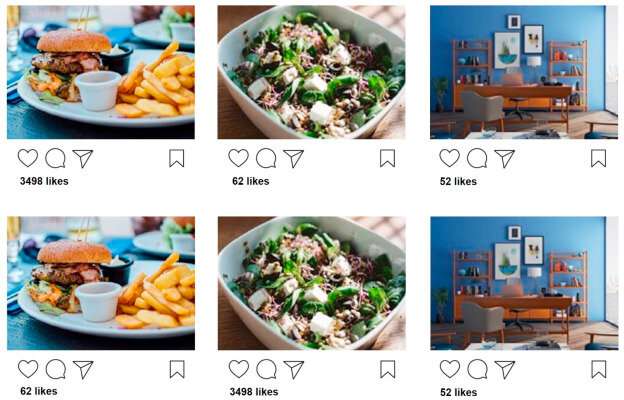Social media ‘likes’ found to positively influence healthy food choices

Social media users who view images of healthy foods that have been heavily endorsed with ‘likes’ are more likely to make healthier food choices, a new study has found.
The research, by psychologists from Aston University’s College of Health and Life Sciences, found that study participants who viewed highly liked mock Instagram posts of fruit and vegetables ate a significantly higher proportion of grapes than cookies, with consumption of grapes increasing by 14 percent more calories, compared to those who viewed highly liked high calorie foods.
The study, which is published in the scientific journal Appetite, investigated the acute effect of socially endorsed social media posts on participants’ eating behavior. The 169 participants, who had an average age of 21 years old (but total ages across the group ranged from 18 to 48), were asked to look at mock Instagram posts of different types of food, that either had a few or a lot of ‘likes,” and later given access to grapes and cookies to consume.
As well as viewing images of fruit and vegetables, participants also looked at less nutritious foods such as cakes and biscuits, and non-food images such as stylish interior designs. However, the researchers found that the participants went on to consume a larger proportion of grapes after viewing highly liked images of fruit and vegetables, compared to the other images.
Aston University psychology Ph.D. student Lily Hawkins, who led the study alongside supervisor Dr. Jason Thomas, said:
“The findings of the study suggest that not only exposure to healthy food images on social media, but those that are also heavily endorsed with ‘likes,” may nudge people to choose to eat more healthy foods, in place of less nutritious foods.”
“What we see others approve of eating and post about eating on social media can affect our actual eating behavior and could result in a greater consumption of healthier meals and snacks.”
“One reason for this may be because thinking that others ‘like’ and eat fruit and vegetables nudges participants to alter their behavior in order to fit in with what they perceive to be the norm.”
The most recent figures from the NHS’s Health Survey for England showed that in 2018 only 28 percent of adults were eating the recommended five portions of fruit and vegetables per day. In Wales, this was 24 percent, in Scotland 22 percent and in Northern Ireland around 20 percent. Children and young people across the UK had even lower levels of fruit and vegetable consumption.
The study findings suggest that social media could be used in future as a way to encourage healthier eating—by encouraging users to follow more social media accounts which have highly liked nutritionally balanced posts, also containing healthier foods.
The researchers said the next stage of their work will trial an intervention using real Instagram accounts, to test whether asking people to actively follow more social media accounts posting images of highly liked nutritionally rich foods, can encourage people to consume more fruit and vegetables over a sustained period of time.
Professor Claire Farrow, director of Aston University’s Applied Health Research Group, whose work has contributed to the national Child Feeding Guide resource, added:
“We know that social interactions can strongly shape what, when and how much we eat. These findings highlight the important role that social media has in shaping those influences online.”
“The findings suggest that people do not simply passively view information about what other people are eating online, but that this digital information can shape our food preferences and choices, particularly when we think lots of other people like certain foods. It is promising that exposure to healthy foods, and likes of those foods, was related to greater intake of healthy foods.”
“Further research is needed to explore whether and how these findings can be translated into digital interventions to help support individuals who want to make healthier food choices, and to understand how social media platforms can be used as a tool to support healthy eating behavior.”
Lily Hawkins et al, Does exposure to socially endorsed food images on social media influence food intake?, Appetite (2021). DOI: 10.1016/j.appet.2021.105424
Citation:
Social media ‘likes’ found to positively influence healthy food choices (2021, September 24)
retrieved 24 September 2021
from https://phys.org/news/2021-09-social-media-positively-healthy-food.html
This document is subject to copyright. Apart from any fair dealing for the purpose of private study or research, no
part may be reproduced without the written permission. The content is provided for information purposes only.
For all the latest Science News Click Here
For the latest news and updates, follow us on Google News.

